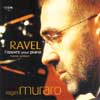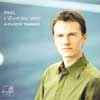Ravel Complete Works for Piano
Ravel was a very private man: getting intimate with his music is hardly any easier
View record and artist detailsRecord and Artist Details
Composer or Director: Maurice Ravel
Genre:
Instrumental
Label: Accord
Magazine Review Date: 1/2004
Media Format: CD or Download
Media Runtime: 155
Mastering:
Stereo
DDD
Catalogue Number: 476 094-1

Tracks:
| Composition | Artist Credit |
|---|---|
| (Le) Tombeau de Couperin |
Maurice Ravel, Composer
Maurice Ravel, Composer Roger Muraro, Piano |
| Sonatine for Piano |
Maurice Ravel, Composer
Maurice Ravel, Composer Roger Muraro, Piano |
| Gaspard de la nuit |
Maurice Ravel, Composer
Maurice Ravel, Composer Roger Muraro, Piano |
| Ma mère l'oye |
Maurice Ravel, Composer
Hortense Cartier-Bresson, Piano Maurice Ravel, Composer Roger Muraro, Piano |
| Pavane pour une infante défunte |
Maurice Ravel, Composer
Maurice Ravel, Composer Roger Muraro, Piano |
| Jeux d'eau |
Maurice Ravel, Composer
Maurice Ravel, Composer Roger Muraro, Piano |
| Miroirs |
Maurice Ravel, Composer
Maurice Ravel, Composer Roger Muraro, Piano |
| Sérénade grotesque |
Maurice Ravel, Composer
Maurice Ravel, Composer Roger Muraro, Piano |
| Menuet antique |
Maurice Ravel, Composer
Maurice Ravel, Composer Roger Muraro, Piano |
| A la manière de Borodine |
Maurice Ravel, Composer
Maurice Ravel, Composer Roger Muraro, Piano |
| A la manière de Chabrier |
Maurice Ravel, Composer
Maurice Ravel, Composer Roger Muraro, Piano |
| (8) Valses nobles et sentimentales |
Maurice Ravel, Composer
Maurice Ravel, Composer Roger Muraro, Piano |
| (La) Valse |
Maurice Ravel, Composer
Maurice Ravel, Composer Roger Muraro, Piano |
| Menuet sur le nom de Haydn |
Maurice Ravel, Composer
Maurice Ravel, Composer Roger Muraro, Piano |
| Prélude |
Maurice Ravel, Composer
Maurice Ravel, Composer Roger Muraro, Piano |
Composer or Director: Maurice Ravel
Genre:
Instrumental
Label: Harmonia Mundi
Magazine Review Date: 1/2004
Media Format: CD or Download
Media Runtime: 138
Mastering:
Stereo
DDD
Catalogue Number: HMC90 1811/2

Tracks:
| Composition | Artist Credit |
|---|---|
| Gaspard de la nuit |
Maurice Ravel, Composer
Alexandre Tharaud, Piano Maurice Ravel, Composer |
| A la manière de Chabrier |
Maurice Ravel, Composer
Alexandre Tharaud, Piano Maurice Ravel, Composer |
| Prélude |
Maurice Ravel, Composer
Alexandre Tharaud, Piano Maurice Ravel, Composer |
| (8) Valses nobles et sentimentales |
Maurice Ravel, Composer
Alexandre Tharaud, Piano Maurice Ravel, Composer |
| Sonatine for Piano |
Maurice Ravel, Composer
Alexandre Tharaud, Piano Maurice Ravel, Composer |
| Pavane pour une infante défunte |
Maurice Ravel, Composer
Alexandre Tharaud, Piano Maurice Ravel, Composer |
| (La) parade |
Maurice Ravel, Composer
Alexandre Tharaud, Piano Maurice Ravel, Composer |
| Miroirs |
Maurice Ravel, Composer
Alexandre Tharaud, Piano Maurice Ravel, Composer |
| Menuet antique |
Maurice Ravel, Composer
Alexandre Tharaud, Piano Maurice Ravel, Composer |
| Jeux d'eau |
Maurice Ravel, Composer
Alexandre Tharaud, Piano Maurice Ravel, Composer |
| Sérénade grotesque |
Maurice Ravel, Composer
Alexandre Tharaud, Piano Maurice Ravel, Composer |
| Menuet sur le nom de Haydn |
Maurice Ravel, Composer
Alexandre Tharaud, Piano Maurice Ravel, Composer |
| (Le) Tombeau de Couperin |
Maurice Ravel, Composer
Alexandre Tharaud, Piano Maurice Ravel, Composer |
| A la manière de Borodine |
Maurice Ravel, Composer
Alexandre Tharaud, Piano Maurice Ravel, Composer |
| Menuet |
Maurice Ravel, Composer
Alexandre Tharaud, Piano Maurice Ravel, Composer |
Author: rnichols
Alexandre Tharaud has been widely praised for his playing of Rameau, in which he acknowledges the influence of the recordings from the 1950s by the great Marcelle Meyer. In this present recording he has chosen to play a modern Steinway in an acoustic that for him recalls some recordings from that same decade – and he has dedicated the recording to Meyer’s memory. He calls the acoustic (of the Lutheran Church of la Villette in Paris) ‘warm and woody’. Certainly it’s not cold or metallic, praise be.
But here the struggle between constants and particulars makes itself felt. The player who disturbs Ravel’s classical syntax, through alterations of dynamics, tempi, articulation or texture, is liable to disrupt the effect of the whole for all his sensitivity to the curious and exotic chords within. In Pavane pour une Infante défunte, for instance, Tharaud uses the warm sound of his Steinway to float phrases with a natural wistfulness, marrying harmoniously the lyrical (Romantic) and mechanical (Classical) elements of the piece.
Concomitantly, such warmth only blurs the harmonic progressions of the Sonatine. Here, as in many other places, I find Tharaud’s pedalling unduly generous (to put it politely) and the result is not helped by clattery inner parts. Perhaps his intention was to get away from the excessive politeness that occasionally marks the playing of Robert Casadesus in his survey of the piano music (Sony – nla). But because we cannot hear clearly the wonderful purposefulness of Ravel’s part-writing, we lose the lyrical shape and are left with the incidental detail.
The confrontation between Classical form and Romantic content is at its sharpest in Gaspard de la nuit. The beginning of ‘Ondine’ shows Tharaud and his Steinway at their best, even if the piano tone loses a little of its mellow wood-iness in the large central climax. But mostly the strong melodic lines and watery textures come over beautifully. ‘Le gibet’ is a prime example of sinister Romanticism conjured up by Classical restraint and control. Heavy pedalling again reduces the impact and I must protest against one particular rise in dynamics (4'02") and the thunderous low B flat octaves that follow: Ravel wanted this piece to be monotonous and, when Ricardo Viñes refused to comply, allotted him no more piano premières. In ‘Scarbo’ Tharaud is commendably agile and steady, and has a feel for the overall structure. But is it dangerous enough?
Roger Muraro approaches Ravel from the direction of Messiaen, of whose music he is a superb interpreter. Like Messiaen, he seems to relish the passionate, Romantic side of Ravel. The problem is, how much of the Classical structure can be stretched before the strains become life-threatening? As I’ve said, Ravel’s structures are logical and developmental, as opposed to Messiaen’s, that are largely built on contrast. Muraro is most successful where the structures are so obvious that no player can misconstrue them, such as the ‘Fugue’ and ‘Toccata’ in Le tombeau de Couperin or the whole of Ma Mère l’Oye, where he is joined by the excellent Hortense Cartier-Bresson.
But where there is room for Romantic ‘interpretation’ (a word Ravel hated), then Muraro too often obligingly fills it: the result is not so much passionate as sentimental. The ‘Menuet’ from Le tombeau must stand as an example of much that I found unappealing. The little finger of Muraro’s right hand frequently, as here, plays much more loudly than the other nine, giving a bright but thin sound. In the central ‘Musette’ he brings out the tune in the right thumb, I feel, just because he can – there is no indication of such a texture in either the piano or the orchestral score. In bar 92 there is a D sharp missing in the left hand, and throughout there are oodles of rubato.
Muraro also gives us Ravel’s piano solo version of La valse, with some extra notes taken from the orchestral score. Tharaud’s two unpublished bonuses are a charming little Menuet – found among exercises submitted to Ravel by his friend and pupil Maurice Delage – and a pot-pourri of two marches, two waltzes and a mazurka, written around 1896 for a private exhibition of dancing and entitled Parade. As Tharaud says, the influence of Chabrier is evident in the latter.
Muraro’s playing is, then, a great disappointment to me. Tharaud has more the measure of Ravel’s Classical/Romantic dichotomy. Neither will replace Casadesus and Jean-Yves Thibaudet in my affections, the first for his refusal to cloud the picture with spin of any kind, the second for his absolute command of both structure and detail, and for the sheer immediacy and vigour of the sound, beside which Tharaud’s Steinway is sometimes dull and slightly distant, and Muraro’s Fazioli harsh and unyielding.
Discover the world's largest classical music catalogue with Presto Music.

Gramophone Digital Club
- Digital Edition
- Digital Archive
- Reviews Database
- Full website access
From £8.75 / month
Subscribe
Gramophone Full Club
- Print Edition
- Digital Edition
- Digital Archive
- Reviews Database
- Full website access
From £11.00 / month
Subscribe
If you are a library, university or other organisation that would be interested in an institutional subscription to Gramophone please click here for further information.




